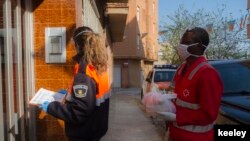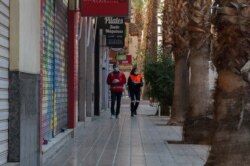Felix Sesay left his native Sierra Leone in 2016 to escape the Ebola outbreak, only to find himself helping others survive another epidemic — COVID-19.
Now, the 23-year-old works with the Red Cross in Spain taking food to elderly people who are at higher risk of catching the coronavirus.
“I am not scared, because I have already survived one epidemic. I have wanted to be a doctor since I was 8 years old. When you sign up to be a medical person, you do so to save lives, and you know that might mean putting your own at risk,” Sesay told VOA in a telephone interview.
When the Ebola outbreak started in western Africa in 2014, Sesay volunteered for the job no one wanted to do — moving the dead to the morgue. He was shunned by family and friends who were afraid of succumbing to the illness.
“They thought I was bewitched because I used to put the bodies in the morgue and somehow, I survived,” he said.
Hardship is nothing new
The combination of Ebola and the civil war wreaking havoc in Sierra Leone prompted Sesay to leave his country for a new life in Europe.
After an arduous journey to Libya, he was robbed of thousands of dollars, which he had hoped to use to pay smugglers to take him across the Mediterranean Sea.
Eventually, a friend loaned him money to board a flimsy, overloaded boat with scores of others trying to cross the sea in 2018.
As the boat began to sink, a helicopter loomed out of the darkness and alerted the nearby Aquarius rescue ship. Sesay’s life was saved.
After Italy and other European states refused the ship entry, Spain finally offered the migrants refuge in June 2018.
Sesay was one of more than 600 migrants who set foot on Spanish soil and began a new life doing odd jobs.
“When the coronavirus started here, I thought I could either stay at home or help out. So, I decided to help the Red Cross,” he said.
Filling a gap
Sesay works for the Red Cross in Torrent, a town near Valencia in southeastern Spain.
The agency’s Ana Gómez Gómez said Sesay's unique experience of living through two epidemics meant he was an asset to the team.
“He worked through something like Ebola, which means he knows how to deal with the problems we have now with coronavirus, and most importantly, is not scared at all,” she said.
Despite volunteering with the Red Cross, Sesay will not be guaranteed a work permit when the health crisis is over.
Hundreds of other foreign health workers living in Spain as migrants have been impeded by bureaucratic hurdles placed by immigration services involved with ratifying their degrees.
The Solidarity for Foreign Health Workers action group has demanded the Spanish government hasten the process for work permits.
“About 80% of foreign health professionals who are part of this group do not have papers to work here,” said Yamile Caicedo, who is from Colombia.
She said under Spanish law, foreign nationals’ work permits can be given priority if there are “motives of public interest or national interest.”
However, Caicedo said, they are being denied the chance to work because they first need to get temporary work permits, which can only be requested by employers.
A spokesman for the Spanish interior ministry confirmed the requirement, which he said was “the law.”
“Employers should request these,” the spokesman said.
Doors closing
Life for many migrants without legal permission to work in Spain has become tougher during the outbreak, as most survive as cleaners, cooks or street beer peddlers.
With their mobility severely restricted under the lockdown that was imposed in March, most look to charities for help.
Since the pandemic, the number of migrants crossing the Mediterranean to Spain has fallen dramatically.
The number of migrants rescued at sea between Jan. 1, 2020, and April 30, 2020, was 5,068, down 21% from 6,429 last year.
“Many thousands who have applied for asylum have also had their applications put on hold because of the virus,” said Paloma Favieres, director of policy at the Spanish Commission for Refugees.
She called attention to a migrant holding center in Melilla, a Spanish territory in north Africa bordering Morocco, where about 1,600 people are being detained in a building designed for 782, presenting a danger of contagion.
The government said the center would be emptied last month but so far, nothing has been done.
Frontex, the European borders agency, calculated that human traffickers have made $172 million in the past three years sending migrants to Spain.





